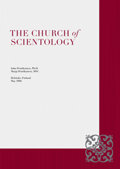Our scrutiny above has indicated that, in a modern world with many new religions, a more open view towards religion and its global variety is needed than the narrow definitions based on interpretations of the Latin concept of “religio” and which still today are often repeated by some governmental officials. The five variables to be included into the category of religion are the 1. intellectual, 2. emotional, 3. actional, 4. social, and 5. cultural factors detailed above first in general and then in the particular case of Scientology.
There are, according to our opinion, many reasons why Scientology may be considered a new religion. What in particular fits into its categorization is the fact that it is a modern Western‑born religion in the very Western meaning of the word “religion.” It clearly is a manifestation of that type of new “religiosity” which has emerged in the Western world using modern media of socio‑cultural networks when transmitting its religious message to a wider public.
In its ambitious efforts to use the advantages of its comprehensive networks it has become one of the most “modern” and “discussed” religions of our era.
In its ambitious efforts to use the advantages of its comprehensive networks it has become one of the most “modern” and “discussed” religions of our era.
What is typical of many of the so‑called new religions is that they have been labelled as “religions” by scholars rather than the practicing people themselves. Instead of establishing any firmly organized formalities, several new religious movements prefer to be quite unarranged bodies. For example, a great number of new neo‑Hindu yoga or meditation groups have no organizations, and they hate to be considered at all “religious.” In their later developments, if necessary, some of them may, however, have become “registered,” possibly even as “scientific” societies in accordance with the federal or national legislation regulating the formation of the “religious” societies and alternative bodies in respective countries.
Since its establishment in 1954, the Church of Scientology has been one of the few new religions which has always identified its organizations and has made strong efforts to become acknowledged as religious bodies. Indeed, Scientology has been recognized as a “church” and a “religion” by many official bodies in various cultures throughout the world.
The doctrine and the Church of Scientology itself are related to the fact that they are based on a vision of a modern American man who was born in the 20th century and who preferred to write and give public lectures rather than preach his message. The idea of religion was not manifest in L. Ron Hubbard’s first writings and teachings, which tried to be experimental and psycho‑philosophical. Dianetics thus became Scientology only once Hubbard discovered its spiritual dimension and its spiritual connections to ancient world religions in his subsequent research.
The teachings of Scientology have their background in various religious and philosophical traditions. The message of a new “book religion” developed and proclaimed by its Founder is faithfully recorded and preserved by the corpus of the sacred scriptures. They, as a whole, provide a source for religious experiences, ritual and more actions as well as the social structure of the Church with its cultural specimens.
The comprehensive social organization of the Church of Scientology with all its networks and cultural infrastructures is an important testimony of its nature as a society which very well could be characterized as a “religious” body. The maritime mythology of its religious order, the Sea Organization, forms the basis for its social structure for those who have decided to pledge their lives fully and eternally to the goals of the Church.
On the basis of our contacts with some members of the Church in the European and national headquarters of the Church in Scandinavian countries, we have recognized that for these people the Church offers both such models for their life style and such experiences as well which can be called religious on the affection and conative levels.
Thus, we have found Scientology to be a religion.





























